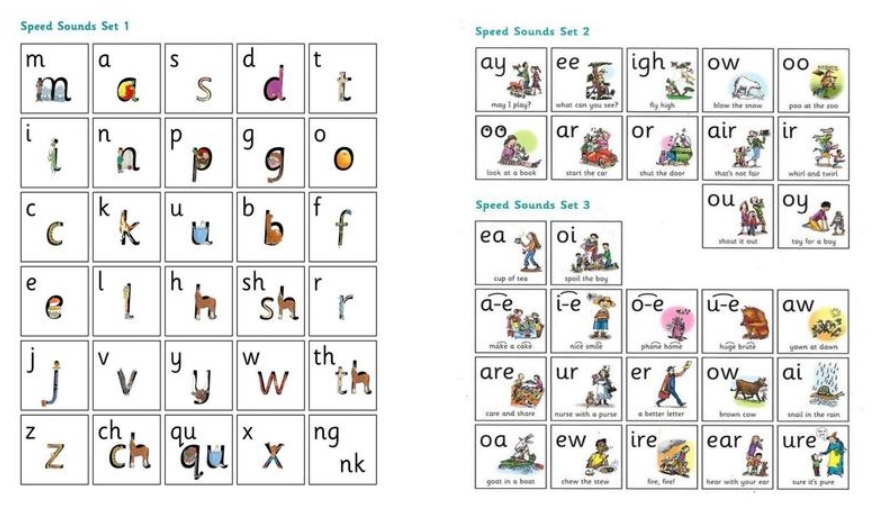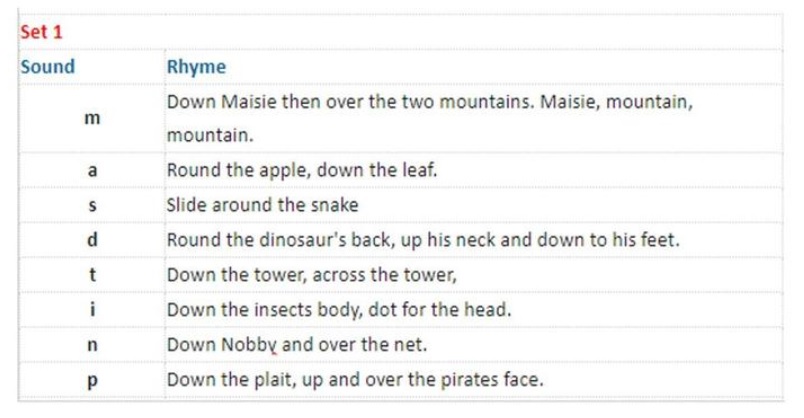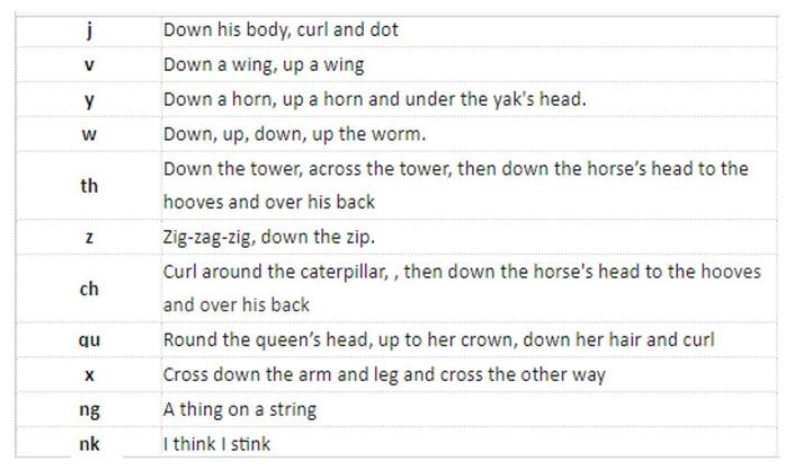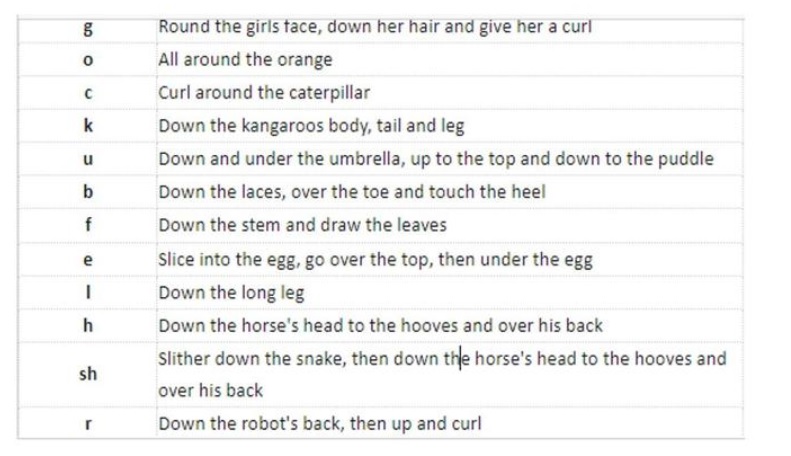Early Reading – Read Write Inc.
Our Aim
- Children who read regularly or are read to regularly have the opportunity to open the doors to so many different worlds!
- More importantly, reading will give your child the tools to become independent life-long learners.We can achieve this together through:
- Read Write Inc, a program to help to your child read at school
- Encouraging children to develop a love of books by reading to them daily, at home and at school
- Giving children access to a wide range of books at school and at home
Understanding Phonics

What is Read Write Inc.
-
Read Write Inc (RWI) is a phonics programme which helps all children learn to read fluently and at speed so they can focus on developing their skills in comprehension, vocabulary and spelling. The programme is designed for children aged 4-7. However, atTMPS we begin to expose children in Nursery to skills that will help them access the taught programme in Reception. We continue teaching RWI to children beyond the age of 7, as we use a stage not age approach.
RWI was developed by Ruth Miskin and more information on this can be found at https://ruthmiskin.com/en/find-out-more/parents/.
Parent Video: What is Read Write Inc Phonics?
How will my child be taught to read?
We start by teaching phonics to the children in the Reception class. This means that they learn how to ‘read’ the sounds in words and how those sounds can be written down. This is essential for reading, but it also helps children learn to spell well. We teach the children simple ways of remembering these sounds and letters.
Reading
The children:
- Learn 44 sounds and the corresponding letters/letter groups using simple picture prompts – see below
- Learn to read words using Fred talk and sound blending
- Read from a range of storybooks and non-fictions books matched to their phonic knowledge
- Work well with partners
- Develop comprehension skills in stories by answering ‘Find It’ and ‘Prove It’ discussion questions
Writing
The children:
- Learn to write and form the letters/letter groups which represent the 44 sounds with the help of fun phrases
- Learn to write words by using Fred Talk
Talking
The children
- They work in pairs so that they:
- Answer every question
- Practise every activity with their partner
- Take turns in talking and reading to each other
- Develop ambitious vocabulary
Read Write Inc Progression of Skills
Progressing through the stages
Children in Early Years are introduced to initial sounds. Children then begin to learn how to ‘read’ the sound in words and how those sounds be can be written down. As children progress, they follow the same format as Early Years but will work on complex sounds and read books appropriate to their reading level. Daily sessions of RWI phonics last 30 minutes. Once children become fluent speedy readers they will move on to the RWI Spelling programme.
Five key principles underpin the teaching in all Read Write Inc. sessions:
Purpose – know the purpose of every activity and share it with the children, so they know the one thing they should be thinking about
Participation – ensure every child participates throughout the lesson. Partnership work is fundamental to learning
Praise – ensure children are praised for effort and learning, not ability
Pace – teach at an effective pace and devote every moment to teaching and learning
Passion – be passionate about teaching so children can be engaged emotionally.
Children will be taught how to read as follows:
Before you start to teach your child, practice saying the sounds below. These are the sounds we use to speak in English. Children initially begin using pictures for each sound, this will help children recognise the sound and then form the shape of the sound.
Fred Talk
We use pure sounds (‘m’ not’ muh’,’s’ not ‘suh’, etc.) so that your child will be able to blend the sounds into words more easily.
At school we use a puppet called Fred who is an expert on sounding out words! we call it, ‘Fred Talk’. E.g. m-o-p, c-a-t, m-a-n, sh-o-p, b-l-a-ck.
The following video is an example of blending sounds with Fred. https://www.youtube.com/watch?v=dEzfpod5w_Q
RWI Set 1, 2 and 3

We encourage all readers to share a book at home with their grown -ups. We believe this not only helps to develop their inferential skills, but also supports a life-long love of reading. We expect children to read 3 times a week and diaries are checked on a weekly basis by the class teacher.
As a school, we recognise the value of reading aloud to children to model appropriate use of story language and reading with expression. We want to enthuse them with a love of books and inspire them as writers. Children have the opportunity to participate in exiting reading activities such as world book day.
Children are taught in 3 sets. Set 1, 2 & 3
Step 1
Set 1 Sounds are taught in the following order together with rhymes to help children form the letters correctly and instantly recognise sounds ready for blending.

At this stage we do not use the letter names
Use the link below to support your pronunciation sounds correctly.
https://www.ruthmiskin.com/en/find-out-more/parents/#lg=1&slide=3


Step 2
The children are then taught Set 2 Sounds – the long vowels. When they are very confident with all of set 1 and 2 they are taught Set 3 Sounds.
|
Set 2 Speed Sounds |
||
|
Sound
|
Phrase |
Words to practice reading and spelling |
|
ay |
ay: may I play |
play, day, may, way, say, spray |
|
ee |
ee: what can you see |
see, three, been, green, seen, sleep |
|
igh |
igh: fly high |
high, night, light, fright, bright, might |
|
ow |
ow: blow the snow |
blow, snow, low, show, know, slow |
|
oo |
oo: poo at the zoo |
too, zoo, food, pool, moon, spoon |
|
oo |
oo: look at a book |
took, look, book, shook, cook, foot |
|
ar |
ar: start the car |
car, start, part, star, hard, sharp |
|
or |
or: shut the door |
sort, short, horse, sport, fork, snort |
|
air |
air: that’s not fair |
fair, stair, hair, air, chair, lair |
|
ir |
ir: whirl and twirl |
girl, bird, third, whirl, twirl, dirt |
|
ou |
ou: shout it out |
out, shout, loud, mouth, round, found |
|
oy |
oy: toy for a boy |
toy, boy, enjoy |
|
Set 3 Speed Sounds |
||
|
Sound
|
Phrase |
Words to practice reading and spelling |
|
ea |
Cup of tea |
clean, dream, seat, scream, real |
|
oi |
Spoil the boy |
join, voice, coin |
|
a-e |
Make a cake |
make, cake, name, same, late, date |
|
i-e |
Nice smile |
smile, white, nice, like, time, hide |
|
o-e |
Phone home |
home, hope, spoke, note, broke, phone |
|
u-e |
Huge brute |
tune, rude, huge, brute, use, June |
|
aw |
Yawn at dawn |
saw, las, dawn, crawl, paw, yawn |
|
are |
Care and share |
share, dare, scare, square, bare |
|
ur |
Nurse with a purse |
burn, turn, spurt, nurse, purse, hurt |
|
er |
A better letter |
never, better, weather, after, proper, corner |
|
ow |
Brown cow |
how, down, brown, cow, town, now |
|
ai |
Snail in the rain |
snail, paid, tail, train, paint, rain |
|
oa |
Goat in a boat |
goat, boat, road, throat, toast, coat |
|
ew |
Chew the stew |
chew, new, blew, flew, drew, grew |
|
ire |
Fire! Fire! |
Fire, hire, wire, bon/fire, in/spire, con/spire |
|
ear |
Hear with your ear |
hear, dear, fear, near, year, ear |
|
ure |
Sure it’s pure |
pure, sure, cure, pic/ture, mix/ture, ad/ven/ture |
Nonsense words (Alien words)- What ‘a load’ or nonsense!
As well as learning to read and blend real words children will have plenty of opportunities to apply their sound recognition skills on reading ‘Nonsense words’. These words will also feature heavily in the Year One Phonics Screening check in the summer term. These words provide endless opportunities for children to apply and practice their thinking in a range of different contexts.
How to say the sounds:
Parent Video: Sound Blending
Parent video: Reading the digraphs with your child
Parent video: Reading the bouncy sounds with your child:
Useful websites for Parents
Please find a list of websites that you may find useful in helping you and your child learn about phonics. Games and fun activity websites are also included.
https://www.ruthmiskin.com/en/find-out-more/parents/ – Information and resources to support phonics learning at home
http://www.bbc.co.uk/bitesize/ks1/literacy/phonics/play/ – fun games for the children to play
http://www.ictgames.com/literacy.html – fun games for the children to play
http://www.firstschoolyears.com/ – fun games for the children to play
BBC Bitesize – many games to play covering all areas of the curriculum